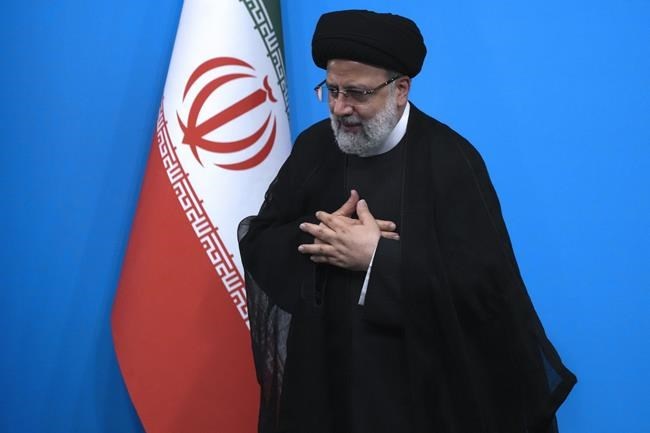DUBAI, United Arab Emirates (AP) ÔÇö Iranian President Ebrahim Raisi, a hard-line protege of the country's supreme leader who helped oversee the mass executions of thousands in 1988 and later led the country as it enriched uranium near weapons-grade levels, launched a major attack on Israel and experienced mass protests, . He was 63.
Raisi's death, along with and other officials in Sunday in northwestern Iran, came as Iran struggles with internal dissent and its relations with the wider world. A cleric first, Raisi once kissed the Quran, the Islamic holy book, before the United Nations and spoke more like a preacher than a statesman when addressing the world.
, who lost a presidential election to the relatively moderate incumbent Hassan Rouhani in 2017, came to power four years later in a vote carefully managed by Supreme Leader Ayatollah Ali Khamenei to clear any major opposition candidate.
His election came at a time when relations between Tehran and Washington were particularly tense following to unilaterally withdraw America from a nuclear deal aimed at limiting IranÔÇÖs uranium enrichment in exchange for sanctions relief.
While Raisi said he wanted to rejoin the deal with world powers, his new administration instead pushed back against international inspections of nuclear facilities, in part over an alleged sabotage campaign that Tehran blamed on Israel. Talks to restore the accord remained stalled in his government's first months.
ÔÇ£Sanctions are the U.S.ÔÇÖ new way of war with the nations of the world,ÔÇØ Raisi told the United Nations in September 2021. ÔÇ£The policy of ÔÇÿmaximum oppressionÔÇÖ is still on. We want nothing more than what is rightfully ours.ÔÇØ
Mass protests swept the country in 2022 after the , a woman who had been detained over her allegedly loose headscarf, or hijab. The killed more than 500 people and more than 22,000 others were detained.
In March, a United Nations investigative panel found that Iran was responsible for the ÔÇ£physical violenceÔÇØ that led to AminiÔÇÖs death.
Then came the , in which Iran-backed militants targeted Israel. Tehran launched an extraordinary attack itself on Israel in April that used . Israel, the U.S. and its allies shot down the incoming fire, but it showed just how intense the yearslong shadow war between Iran and Israel was.
Born in Mashhad on Dec. 14, 1960, Raisi came from a family that traces its lineage to IslamÔÇÖs Prophet Muhammad, as signaled by the black turban he would later wear. His father died when he was 5. He went on to the seminary in the Shiite holy city of Qom and later described himself as an ayatollah, a high-ranking Shiite cleric.
On Monday, state-run media referred to Raisi as being ÔÇ£martyred while serving the nation.ÔÇØ Khamenei said Raisi ÔÇ£did not believe in tiredness.ÔÇØ Others cited the detente reached last year with Saudi Arabia as a major milestone.
But activists abroad, like the New York-based Center for Human Rights in Iran, described his presidency as seeing ÔÇ£a stunning escalation of state repression and violence against peaceful dissent in Iran.ÔÇØ
ÔÇ£Raisi presided over a country suffocated by a regime that fears its own people,ÔÇØ said Hadi Ghaemi, the center's executive director. ÔÇ£He was merely one boot on the necks of the Iranian people; others can easily take his place.ÔÇØ
In 1988, at the end of Iran's long war with Iraq, Raisi served on what would become known as ÔÇ£death commissions,ÔÇØ which handed down death sentences for political prisoners, militants and others. International rights groups estimate that as many as 5,000 people were executed.
After IranÔÇÖs then-Supreme Leader Ruhollah Khomeini accepted a U.N.-brokered cease-fire, members of the Iranian opposition group Mujahedeen-e-Khalq, heavily armed by Iraq's Saddam Hussein, stormed across the Iranian border in a surprise attack. Iran ultimately blunted their assault, but the attack set the stage for the .
Some who appeared were asked to identify themselves. Those who responded ÔÇ£mujahedeenÔÇØ were .
Raisi was defiant when asked at a news conference after his election about the executions.
ÔÇ£I am proud of being a defender of human rights and of peopleÔÇÖs security and comfort as a prosecutor wherever I was,ÔÇØ said Raisi, who also served as Iran's attorney general for a time.
In 2016, Khamenei appointed Raisi to run the Imam Reza charity foundation, which manages a conglomerate of businesses and endowments in Iran. It is one of many bonyads, or charitable foundations, fueled by donations or assets seized after IranÔÇÖs 1979 Islamic Revolution.
These foundations offer no public accounting of their spending and answer only to IranÔÇÖs supreme leader. The Imam Reza charity, known as ÔÇ£Astan-e Quds-e RazaviÔÇØ in Farsi, is believed to be one of the biggest. Analysts estimate its worth at tens of billions of dollars as it owns almost half the land in Mashhad, IranÔÇÖs second-largest city.
At RaisiÔÇÖs appointment to the foundation, Khamenei called him a ÔÇ£trustworthy person with high-profile experience.ÔÇØ That led to analyst speculation that Khamenei could be grooming Raisi as a possible candidate to be IranÔÇÖs third-ever supreme leader, a Shiite cleric who has final say on all state matters and serves as the countryÔÇÖs commander-in-chief.
Though Raisi lost his 2017 campaign, he still garnered nearly 16 million votes. Khamenei installed him as the head of Iran's internationally criticized judiciary, long known for its closed-door trials of human rights activists and those with Western ties. The U.S. Treasury in 2019 sanctioned Raisi ÔÇ£for his administrative oversight over the executions of individuals who were juveniles at the time of their crime and the torture and other cruel, inhuman, or degrading treatment or punishment of prisoners in Iran, including amputations.ÔÇØ
By 2021, Raisi became the dominant figure in the election after a panel under Khamenei disqualified candidates who posed the greatest challenge to his protege. He swept nearly 62% of the 28.9 million votes in that election. Millions stayed home and others voided ballots, resulting in the lowest turnout by percentage in the Islamic RepublicÔÇÖs history.
Raisi is survived by his wife and two daughters.
Jon Gambrell, The Associated Press



